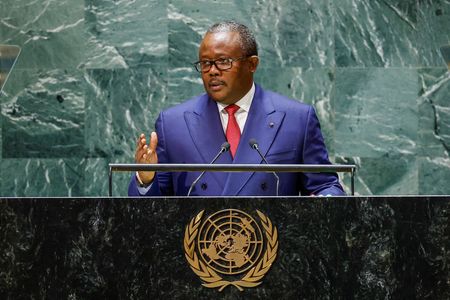By Anait Miridzhanian
BISSAU (Reuters) -Guinea-Bissau President Umaro Sissoco Embalo struck a confident note as he kicked off his re-election bid in early November, claiming that "stability has been achieved" since he took office in 2020.
Ahead of results expected to be announced on Thursday, Embalo called journalists to say he had been deposed. Army officers on Wednesday went on state television to announce they had seized power in the coup-prone country.
The unrest was consistent with Embalo's rocky tenure in which his government announced three attempted coups during his time in office.
Critics say that as political instability persisted, Embalo also failed to rein in the country's notorious cocaine trade or to significantly improve health and education in the impoverished West African country of about 2 million people.
"The largest investment during this period was concentrated in the defence and security sectors, while the social areas, health and education, were relegated to abandonment," political analyst Rui Jorge Semedo said.
TURBULENT POLITICAL RISE
Embalo, a 53-year-old former army general, served as a presidential adviser and minister in previous administrations before President Jose Mario Vaz named him prime minister in 2016.
He lasted just over a year before being fired, one of the seven prime ministers appointed by Vaz.
Embalo was declared winner of the 2019 presidential election after facing off against former Prime Minister Domingos Simoes Pereira.
But opposition parties alleged election fraud, and questioned the legitimacy of his time in office. Embalo denied those allegations.
The first reported coup attempt occurred in 2022, followed by clashes in the capital the following year, which Embalo said was another attempt to oust him.
He dissolved parliament in response, and the country has gone without a functioning lawmaking body ever since.
In October, the army announced yet another coup attempt, leading to the arrests of a group of senior army officers.
Nevertheless, Embalo was seen as being in a strong position to win a second term.
That's because his main rival Pereira was barred from running, as were legislative candidates from Pereira's African Party for the Independence of Guinea and Cape Verde (PAIGC), which led the fight for independence from Portugal in the 1960s and 1970s.
COCAINE TRADE BOOMS
Embalo optimistically promised real change for the population, which is largely dependent on cashew production, after striking a deal with U.S. oil major Chevron to explore two offshore blocks.
He has also touted the country's mineral assets, including bauxite and phosphate.
Yet the cocaine trade flourished under Embalo's watch, with the country consolidating its position as a key transit point for smugglers shipping drugs from South America to Europe.
Last year, police seized 2.63 metric tons of cocaine from South America at the main airport in an operation backed by the U.S. Drug Enforcement Administration and Portuguese Judicial Police.
"Bissau's cocaine market is booming once again, and has arguably become more profitable than at any point in the country's history," the Global Initiative Against Transnational Organized Crime said in a report in August.
Fernando Dias, 47, Embalo's top rival on the ballot this month, had criticised the incumbent for the illicit trade, telling Reuters in an interview before Sunday's vote that responsibility ultimately stopped with the president.
"He is the head of government. Nobody does anything without his authorization," Dias said.
Analysts had predicted a tight contest between Embalo and Dias, and more than 65% of voters turned out on Sunday, according to the electoral commission.
Embalo and Dias both claimed an outright victory earlier this week, saying they had received more than 50% of the vote and would therefore avoid a runoff.
The army officers who said they had seized power, however, announced that they had suspended the electoral process, along with shutting borders and enforcing a curfew, leaving Embalo's vision of stability in tatters.
(Reporting by Alberto Dabo and Anait Miridzhanian; Additional reporting by Catarina Demony; Writing by Robbie Corey-Boulet and Jessica Donati; Editing by Ros Russell and Diane Craft)




